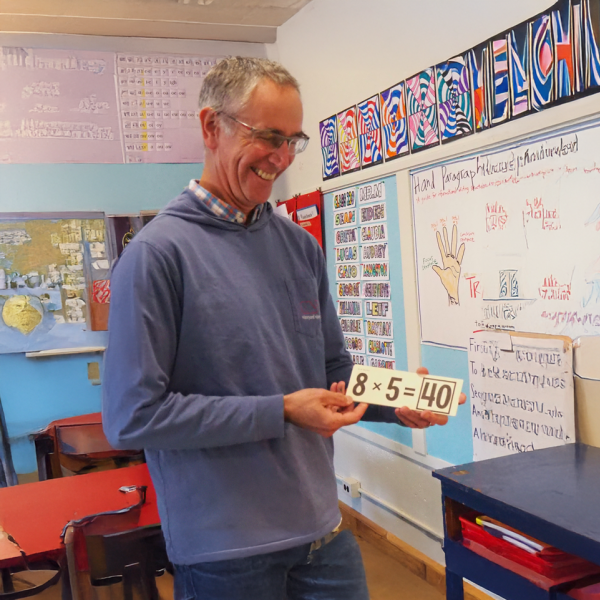Why we're making it a priority
Vermont has faced teacher shortages for more than a decade, particularly in rural communities and in high-need fields like math and special education. As veteran educators retire or leave the profession, and as the number of graduates from Vermont’s teacher preparation programs has dropped by half, the shortage has only deepened.
-
Vermont has 10% fewer teachers than it did before the pandemic, the second-largest decline in the country.
-
Rural schools have the highest share of teachers working under emergency or provisional licenses, according to the Vermont Agency of Education.
Because teacher quality is one of the strongest predictors of student success, the consequences of this workforce shortage are significant.
How we're making it a priority
Educator workforce development and diversification is a highly intersectional issue, touching everything from credentialing and licensure pathways, to hiring practices and school climate, to geographic pay disparity and the availability of housing for newly hired teachers.
Absent a clear state-led strategic plan to support educator workforce development, we lean on the framework offered by the Diversifying the Educator Workforce report from the New England Secondary School Consortium (NESSC) when determining roles for philanthropy to support this issue. The report names diversification as a central workforce development strategy and recommends five key strategies necessary to build a stronger educator workforce:
Cultivating an Interest in Becoming an Educator
 Supporting Vermont youth to explore careers in education.
Supporting Vermont youth to explore careers in education.
What we’re doing:
- Providing easy-access mini-grants to school-based programs through which students explore careers in education;
- Supporting a “next-generation teachers” program in schools across Vermont’s Northeast Kingdom
- Funding the development and implementation of coordinated professional learning for CTE program instructors to teach credit-bearing, college-level education courses to youth;
- Exploring strategies to improve the professional connection of Vermont’s work-based learning coordinators.
Recruit, Hire & Retain Educators
Districts need support to recruit educators, especially diverse educators in rural regions.
What we’re doing:
- Funding professional learning opportunities through the Vermont Principals Association.
- Supporting affinity groups for Vermont teachers and administrators.
Supporting the Completion of Educator Preparation Programs
 The traditional pathways to licensure, including college-based prep programs, are associated with inequitable access and success rates.
The traditional pathways to licensure, including college-based prep programs, are associated with inequitable access and success rates.
What we’re doing:
Supporting VTSU to stipend the unpaid full-time student teaching semester of students pursuing licensure. Six other states have recently introduced and passed legislation to stipend similar student teaching placements for students at public institutions.
Streamlining Certification
 Vermont needs more innovative and supportive pathways to licensure. In the 2023/24 school year, only 151 people received their initial teacher license through a traditional university-based prep program in Vermont. That’s not enough to meet the 7,460 openings projected over the next decade.
Vermont needs more innovative and supportive pathways to licensure. In the 2023/24 school year, only 151 people received their initial teacher license through a traditional university-based prep program in Vermont. That’s not enough to meet the 7,460 openings projected over the next decade.
What we’re doing:
Supporting the Vermont Rural Education Collaborative (VREC) to develop and pilot Vermont’s first-ever registered apprenticeship program for K12 teaching, through which thirty residents of the Northeast Kingdom are pursuing teacher licensure while they work in some of the most rural schools in the state. The AOE and VDOL are now supporting this effort.
We're also supporting Vermont State University (VTSU) to develop and market its new Rural Teacher Apprenticeship Program, designed for aspiring elementary and K-8 special education educators, and a 2+2 Pathway in Education with the Community College of Vermont (CCV).
Systems & Network-Building
Collaborating with regional philanthropy efforts to strengthen and diversify the educator workforce.
What we’re doing:
Joining the Barr Foundation in supporting the Vermont chapter of Great Schools Partnership’s New England-wide “Diversifying the Educator Workforce” Collaborative.
What’s Next?
As we learn alongside our current grantee partners, we invite ideas about roles for philanthropy to continue supporting teacher workforce development and diversification in Vermont. Please reach out to Executive Director Carolyn Weir at cweir@vermontcf.org.
 The traditional pathways to licensure, including college-based prep programs, are associated with inequitable access and success rates.
The traditional pathways to licensure, including college-based prep programs, are associated with inequitable access and success rates. Vermont needs more innovative and supportive pathways to licensure. In the 2023/24 school year, only 151 people received their initial teacher license through a traditional university-based prep program in Vermont. That’s not enough to meet the 7,460 openings projected over the next decade.
Vermont needs more innovative and supportive pathways to licensure. In the 2023/24 school year, only 151 people received their initial teacher license through a traditional university-based prep program in Vermont. That’s not enough to meet the 7,460 openings projected over the next decade.